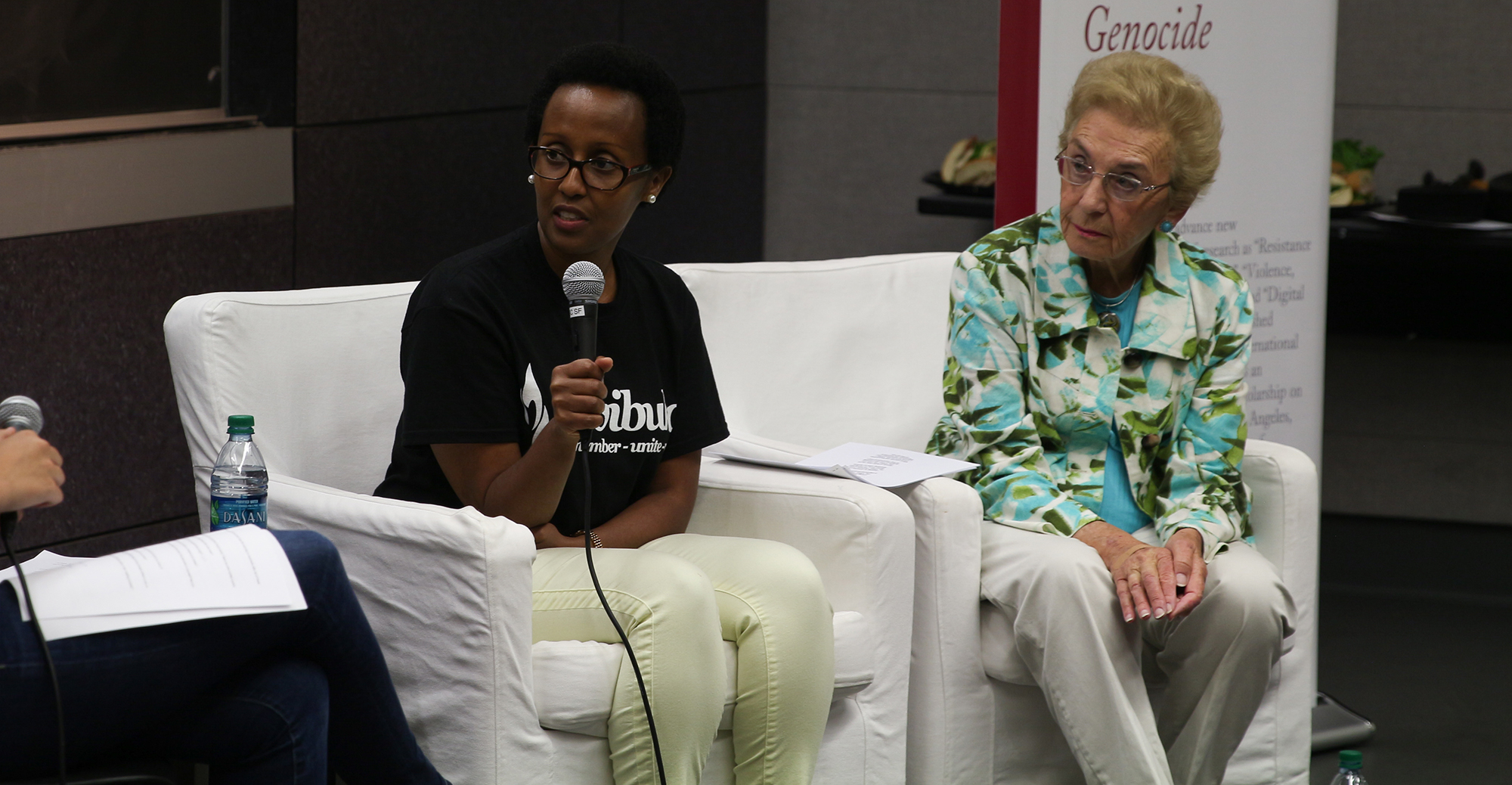Survivors Share Poetry at Student-Led Event “Genocide Through Poetry”

Watch the Facebook live stream of the event here
Twenty-two and 71 years after surviving genocide, Edith Umugiraneza and Celina Biniaz, respectively, shared poetry they wrote about their experiences at a special event organized by DEFY, USC Shoah Foundation’s student association.
When Memories Unfold: Poetry After Genocide was led by USC seniors Marina Kay and Rebecca Homan, president and vice president of DEFY and USC Shoah Foundation interns. Umugiraneza and Biniaz have each given their testimony to USC Shoah Foundation.
Umugiraneza spoke first. She explained that during the genocide against the Tutsi in Rwanda, her happy childhood with her three brothers, three sisters and her mother was taken away. Her mother and two brothers were killed, and Umugiraneza was left wondering why the genocide had happened, and why she had survived.
“I couldn’t see my future because I didn’t have any hope left,” she said.
Then, one day in April 2014 while she was working at the USC Shoah Foundation office, Umugiraneza said she couldn’t stop thinking about the genocide’s upcoming 20th anniversary.
“I started thinking about the genocide I went through as the emotion, the feelings kept rising up I kept thinking about my mother,” she said. “Before I realized what I was doing, I took a pen and paper and started writing what was rising up.”
What she wrote was the poem “God Made a Wonderful Mother,” and Umugiraneza recited it for the audience. It ends with the lines,
Of course no. Can they understand what happened? Of course no. Even myself I don't' understand. I don’t understand what they did to you. I can’t turn back on yesterday,
I survived why?
I have to stand and fight against Genocide ideology.
Mother, I promise try to accomplish what you did not get a chance to accomplish,
I will help inspire others as you used to do.
Biniaz spoke next. She explained that she had never written about the Holocaust until just this past year, when she signed up for a class that turned out to be about poetry at the Osher Lifelong Learning Institute at California State University, Channel Islands.
Inspired by her trip to Poland for the 70th anniversary of the liberation of Auschwitz in January 2015, she decided to write about the different phases of her survival journey, including her trip via cattle car to Auschwitz, selection, liberation and finally her beloved tutor, a 90 year old German nun who taught her just before she moved to the United States as a teenager.
About her German tutor, named Mater Leontine, Biniaz wrote:
She’s German and Catholic.
She will teach a 14 year old gir, traumatized by years of ghettoes and camps German and English.
She does not know she’s supposed to hate her.
Hitler’s ideas and propaganda are not part of her knowledge.
Her outlook on life, gentle manner and total acceptance slowly worked the magic of transformation, the realization that not all Germans are ogres.
After reading their poetry, Biniaz and Umugiraneza answered questions from Kay and Homan. Kay asked Biniaz to respond to German philosopher Theodor Adorno’s declaration that “To write poetry after something like Auschwitz is barbaric.”
“There is no way to describe Auschwitz unless you’ve been there. The barbarism cannot be put into words. So in that sense he is correct,” Biniaz said. “But in a way by talking about it and writing about it, it helps you. It helps you with your feelings to get it out.”
Umugiraneza also described her emotional journey of returning to Rwanda after many years and writing and sharing her poem. She sent the poem to her colleague Karen Jungblut, USC Shoah Foundation Director of Collections, and Jungblut immediately urged her to share it with others.
“As many other survivors who lost their mother, the poem is for them too,” Umugiraneza said. “They have the same experiences, the same feelings.”